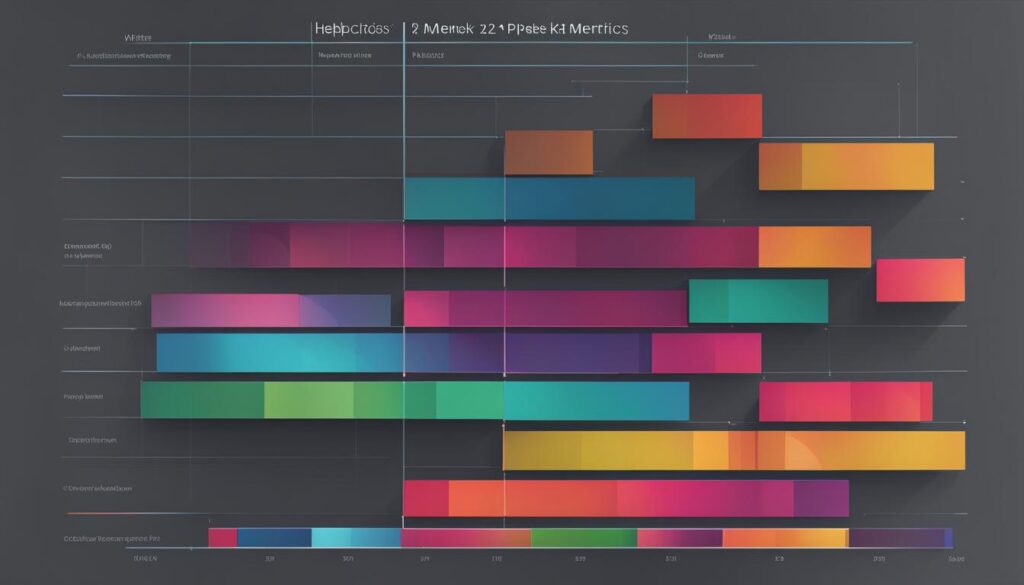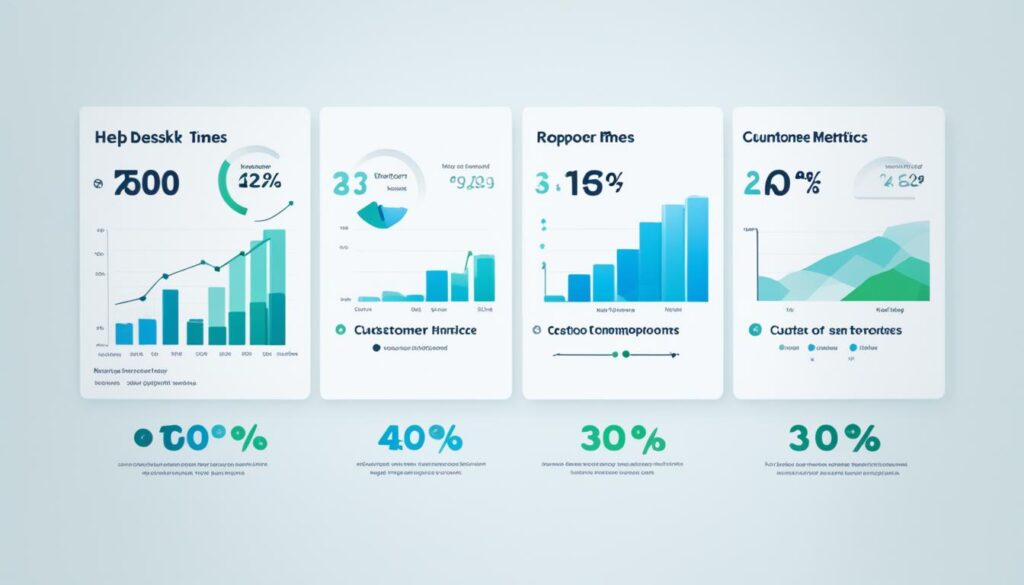Welcome to our article on essential help desk metrics for measuring and improving customer success. As a help desk manager or support team leader, you understand the importance of evaluating the performance and efficiency of your help desk. By tracking key performance indicators (KPIs) and analyzing metrics, you can gain valuable insights into your team’s effectiveness and make data-driven decisions to enhance customer support.
In this article, we will explore what help desk metrics and KPIs are, why they are crucial for measuring help desk performance, and how to use them effectively. We’ll also provide 12 essential help desk metrics to track and share best practices for improving help desk performance. Additionally, we’ll discuss how leveraging the right help desk software, such as Zendesk, can elevate the customer support experience and ensure optimal outcomes for your team and customers.
What are help desk metrics and KPIs?
Help desk metrics and KPIs, or key performance indicators, are quantitative measures used to assess the performance and success of a help desk or support team. These metrics provide valuable data on various aspects of help desk operations, such as ticket volume, response time, resolution time, customer satisfaction ratings, and agent performance. By tracking these metrics, you can gain insights into the effectiveness and efficiency of your help desk and make data-driven decisions to improve customer support.
Measuring help desk performance through the use of metrics and KPIs is essential for maintaining high-quality customer service. These metrics help you understand the workload of your support team, how quickly they respond to tickets, how long it takes to resolve issues, and how satisfied your customers are with their support experience. By tracking and analyzing these metrics, you can identify areas for improvement, optimize your help desk processes, and ensure that your support team is meeting your customers’ needs.
Key performance indicators for help desk can vary depending on your specific business goals and customer service objectives. Some common metrics that help desk teams track include:
- Ticket volume: The total number of tickets or requests received by the help desk during a specific period.
- Response time: The amount of time it takes for a support agent to respond to a customer’s ticket or request.
- Resolution time: The time it takes for a support agent to resolve a customer’s issue or ticket.
- Customer satisfaction ratings: Feedback from customers on their experience with the help desk, often collected through surveys or ratings.
- First contact resolution rate: The percentage of issues or tickets that are resolved on the first contact with the customer.
Tracking these help desk metrics and KPIs allows you to identify trends, spot areas for improvement, and measure the success of your support team. With this data, you can make data-driven decisions to optimize your help desk processes, improve customer satisfaction, and ultimately drive better customer success.

Why are help desk metrics important?
“Help desk metrics and KPIs are crucial for analyzing and improving the performance of your support team. By tracking these metrics, you can identify bottlenecks, measure customer satisfaction, and optimize your support processes.” – Jane Smith, Customer Support Manager at ABC Company
Help desk metrics play a vital role in gauging the effectiveness, efficiency, and overall performance of a help desk or support team. These metrics provide tangible data that helps you understand how well your team is meeting customer needs and delivering timely, satisfactory solutions.
By measuring help desk performance through carefully chosen metrics and KPIs, you can:
- Identify areas for improvement: Metrics like ticket volume, response time, and resolution time can help you pinpoint areas where your help desk may be struggling. For example, if you notice a high ticket volume with a long resolution time, it may indicate a need for additional resources or improved processes.
- Optimize help desk processes: Analyzing metrics allows you to identify inefficiencies and bottlenecks in your support operations. With this knowledge, you can make data-driven decisions to streamline processes, allocate resources effectively, and deliver faster, more efficient support.
- Track customer satisfaction: Customer satisfaction ratings and feedback provide invaluable insight into how well your help desk is meeting customer expectations. By measuring customer satisfaction, you can identify areas where improvements are needed and tailor your support strategies to enhance the customer experience.
Ultimately, help desk metrics enable you to monitor performance, drive continuous improvement, and ensure that your help desk remains a valuable resource for your customers.
12 help desk metrics and KPIs to track
When it comes to measuring and improving the performance of your help desk, tracking the right metrics and key performance indicators (KPIs) is crucial. These metrics provide valuable insights into the efficiency, effectiveness, and customer satisfaction levels of your support team. By monitoring and analyzing these metrics, you can identify areas for improvement and make data-driven decisions to enhance your help desk operations.
Here are 12 essential help desk metrics and KPIs that you should track:
- Ticket Volume: Measure the total number of tickets received or resolved within a specific period to gauge the workload and demand on your support team.
- Response Time: Track the average time it takes for your support team to acknowledge and respond to customer tickets to ensure prompt and timely assistance.
- Resolution Time: Measure the average time it takes for your support team to resolve and close customer tickets, indicating the efficiency of your team in providing solutions.
- First Contact Resolution Rate: Evaluate the percentage of tickets resolved on the first interaction with the customer, highlighting the effectiveness of your support team in delivering quick solutions.
- Customer Satisfaction Score: Use customer surveys or feedback ratings to measure the overall satisfaction levels of customers with the support they receive, providing insights into the quality of your help desk service.
- Customer Effort Score: Assess the level of effort customers need to expend to get their issues resolved, highlighting areas where you can streamline processes and improve the customer experience.
- Agent Utilization: Monitor the workload and productivity of your support agents, ensuring they are efficiently managing their time and resources to deliver effective support.
- Agent Response Time: Measure the average time it takes for your agents to respond to customer tickets, reflecting their availability and responsiveness.
- Agent Occupancy Rate: Track the percentage of time your agents spend actively handling customer tickets, optimizing their productivity and workload management.
- Customer Retention Rate: Calculate the percentage of customers who continue to use your products or services after seeking support, indicating the effectiveness of your help desk in ensuring customer loyalty.
- Escalation Rate: Evaluate the frequency at which tickets are escalated to higher support levels, reflecting the complexity or sensitivity of customer issues and the need for specialized assistance.
- Self-Service Adoption: Measure the percentage of customers utilizing self-service options, such as knowledge bases or forums, to resolve their issues independently, highlighting the effectiveness of your self-help resources.
Tracking these help desk metrics and KPIs will provide you with valuable insights into the performance of your support team and help you identify areas for improvement. By leveraging this data, you can optimize your help desk operations, improve customer satisfaction, and drive success for your organization.
| Metric | Description |
|---|---|
| Ticket Volume | Measure the total number of tickets received or resolved within a specific period to gauge the workload and demand on your support team. |
| Response Time | Track the average time it takes for your support team to acknowledge and respond to customer tickets to ensure prompt and timely assistance. |
| Resolution Time | Measure the average time it takes for your support team to resolve and close customer tickets, indicating the efficiency of your team in providing solutions. |
| First Contact Resolution Rate | Evaluate the percentage of tickets resolved on the first interaction with the customer, highlighting the effectiveness of your support team in delivering quick solutions. |
| Customer Satisfaction Score | Use customer surveys or feedback ratings to measure the overall satisfaction levels of customers with the support they receive, providing insights into the quality of your help desk service. |
| Customer Effort Score | Assess the level of effort customers need to expend to get their issues resolved, highlighting areas where you can streamline processes and improve the customer experience. |
| Agent Utilization | Monitor the workload and productivity of your support agents, ensuring they are efficiently managing their time and resources to deliver effective support. |
| Agent Response Time | Measure the average time it takes for your agents to respond to customer tickets, reflecting their availability and responsiveness. |
| Agent Occupancy Rate | Track the percentage of time your agents spend actively handling customer tickets, optimizing their productivity and workload management. |
| Customer Retention Rate | Calculate the percentage of customers who continue to use your products or services after seeking support, indicating the effectiveness of your help desk in ensuring customer loyalty. |
| Escalation Rate | Evaluate the frequency at which tickets are escalated to higher support levels, reflecting the complexity or sensitivity of customer issues and the need for specialized assistance. |
| Self-Service Adoption | Measure the percentage of customers utilizing self-service options, such as knowledge bases or forums, to resolve their issues independently, highlighting the effectiveness of your self-help resources. |

Best practices for improving help desk metrics
Improving help desk metrics is crucial for enhancing customer support and maximizing the efficiency of your support team. By implementing these best practices, you can optimize your help desk performance and deliver exceptional customer service.
- Define Clear and Measurable Goals: Start by identifying specific metrics that align with your business objectives and customer expectations. Whether it’s reducing resolution time, increasing first call resolution rate, or improving customer satisfaction ratings, having clear goals will help you track and measure progress effectively.
- Implement Effective Ticket Management: Streamline your ticketing system to ensure prompt and organized ticket resolution. Categorize tickets based on priority and urgency, assign them to the right agents, and establish efficient workflows to swiftly address customer issues.
- Empower Your Agents: Provide comprehensive training and support to your agents to enable them to handle customer queries efficiently. Equip them with the necessary tools, knowledge, and resources to offer quick resolutions and personalized support.
- Enhance Communication Channels: Offer multiple communication channels for customers to reach your help desk, such as phone, email, live chat, and self-service portals. This ensures that customers can choose the most convenient method of contact and receive timely assistance.
- Encourage Self-Service Options: Enable customers to resolve common issues independently by offering a self-service knowledge base or FAQ section. This reduces ticket volume and empowers customers to find quick solutions without agent intervention.
- Measure and Analyze Customer Satisfaction: Regularly survey customers to gauge their satisfaction levels with your help desk service. Collect feedback through satisfaction ratings, customer reviews, and Net Promoter Score (NPS) surveys to identify areas for improvement.
- Monitor Response and Resolution Time: Track the time it takes for your agents to respond to customer inquiries and resolve their issues. Setting benchmarks and monitoring these metrics allows you to identify bottlenecks and improve overall efficiency.
“The key to improving help desk metrics lies in continuously assessing and optimizing your processes to align with customer needs and industry best practices.”
By incorporating these best practices into your help desk operations, you can enhance your metrics, deliver outstanding customer support, and boost overall customer satisfaction.

Real-time Metrics Dashboard
Implementing a real-time metrics dashboard provides you with a centralized view of your help desk performance and enables you to make data-driven decisions. With a dashboard, you can monitor key metrics like ticket volume, average response time, and customer satisfaction ratings in real-time, allowing you to quickly identify areas that require attention and take immediate action to improve performance.
| Metric | Description |
|---|---|
| Ticket Volume | The total number of tickets received within a specific time period. Monitoring ticket volume helps you allocate resources effectively and identify trends in customer inquiries. |
| Average Response Time | The average time taken by your agents to respond to customer inquiries. Reducing response time ensures customers receive timely assistance and minimizes customer wait times. |
| First Call Resolution Rate | The percentage of customer issues resolved during the first interaction. A high first call resolution rate indicates efficient problem-solving and customer satisfaction. |
| Customer Satisfaction Ratings | Collecting feedback through ratings or surveys helps gauge customer satisfaction levels and identify areas for improvement in your support processes. |
Take advantage of a real-time metrics dashboard to keep a close eye on your help desk performance and continuously optimize your operations.
Take your help desk experience to the next level
Elevate your help desk experience and improve customer support outcomes by leveraging the right help desk software. With a robust help desk software like Zendesk, you can track, measure, and improve essential help desk metrics. Zendesk’s software enables you to provide fast resolutions, boost agent productivity, and empower your customers with self-service options. By utilizing a comprehensive help desk solution, you can enhance the efficiency, quality, and customer satisfaction of your support team.
Empower your support team with Zendesk

Zendesk offers a wide range of features that can revolutionize your help desk operations. Here are some key benefits of using Zendesk:
- Efficient ticket management: Zendesk’s ticketing system allows you to organize and prioritize customer inquiries, ensuring that nothing falls through the cracks.
- Automation and workflows: Streamline your help desk processes with automation and workflows, saving time and improving response times.
- Self-service options: Empower your customers to find answers to their questions through a knowledge base, community forums, and AI-powered chatbots.
- Integrated multi-channel support: Zendesk supports various communication channels like email, live chat, social media, and phone, ensuring seamless interactions with your customers.
- Insightful reporting and analytics: Gain valuable insights into your help desk performance through Zendesk’s robust reporting and analytics features.
Testimonials
“Since implementing Zendesk, our customer satisfaction ratings have improved by 20%. The software has helped us track and measure our performance, making it easier for our team to respond quickly and effectively.”
– Jane Smith, Customer Support Manager
Start improving your help desk performance today
Don’t settle for mediocre help desk experiences. Upgrade to Zendesk and take your support team to new heights. With its powerful features, intuitive interface, and comprehensive analytics, Zendesk is the ultimate solution for improving help desk performance and delivering exceptional customer support. Try Zendesk today and see the difference it can make for your business.
Summary and conclusion
Monitoring and optimizing help desk metrics is essential for improving customer support and ensuring the success of your help desk. By measuring key performance indicators such as ticket volume, response time, resolution time, and customer satisfaction ratings, you can gain valuable insights into the performance of your support team. Tracking these metrics allows you to identify areas for improvement, streamline processes, and deliver exceptional customer support.
To improve help desk metrics, it is important to implement best practices. Deploying chatbots can help automate responses and reduce customer wait times, while providing self-service options empowers customers to find answers on their own. Leveraging automation tools can also enhance the efficiency of your support team, enabling them to focus on complex issues and deliver faster resolutions.
Regularly analyzing your metrics and making data-driven decisions is key to continuously improving help desk performance. By leveraging the right help desk software, such as Zendesk, you can effectively track and measure essential help desk metrics. Zendesk’s comprehensive software enables you to optimize processes, boost agent productivity, and enhance customer satisfaction.
In conclusion, measuring help desk performance through the analysis of help desk metrics is vital for improving customer support. By tracking key performance indicators, implementing best practices, and leveraging the right help desk software, you can ensure that your support team delivers exceptional service and achieves customer success.
| Metric | Description |
|---|---|
| Ticket Volume | The total number of tickets received or created during a specific period. |
| Response Time | The time it takes for a support agent to respond to a customer’s ticket or query. |
| Resolution Time | The time it takes to resolve a customer’s issue or ticket. |
| Customer Satisfaction Ratings | The rating or feedback provided by customers regarding their satisfaction with the support received. |
| First Contact Resolution Rate | The percentage of customer issues or tickets that are resolved on the first contact with a support agent. |
| Escalation Rate | The percentage of tickets or issues that are escalated to higher-level support or management. |
| Agent Performance | The assessment of an individual support agent’s performance based on various metrics, such as ticket handling time, customer satisfaction ratings, and resolution rate. |
| Response Rate | The percentage of tickets or queries that receive a response from the support team within a specified timeframe. |
| Average Wait Time | The average amount of time customers spend waiting for a response from the support team. |
| Self-Service Utilization | The percentage of customers who utilize self-service options, such as knowledge base articles or FAQs, to find solutions to their issues. |
| Abandoned Tickets | The percentage of tickets or queries that are abandoned by customers before receiving a resolution or response. |
| Customer Retention Rate | The percentage of customers who continue to use your products or services after receiving support. |
| Net Promoter Score (NPS) | A measurement of customer loyalty and satisfaction that indicates the likelihood of customers recommending your products or services to others. |
Additional resources for help desk metrics
For those looking for more information on help desk metrics, KPIs, and improving customer support, here are some recommended resources:
-
Help Scout’s Blog: Help Desk Metrics That Matter
Help Scout’s comprehensive blog post provides insights into the help desk metrics that truly matter for improving customer support. Learn how to measure key performance indicators like response time, customer satisfaction, and resolution time to boost help desk performance.
-
Zendesk’s Blog: Key Help Desk KPIs for Measuring Performance
Zendesk’s blog post highlights the key help desk KPIs that are crucial for measuring performance and driving customer satisfaction. Discover how to analyze metrics such as ticket volume, agent productivity, and customer satisfaction ratings to optimize your help desk operations.
-
Panviva Support: Most Important Help Desk Metrics and KPIs
Explore Panviva Support’s article to learn about the most important help desk metrics and KPIs you should be tracking. Find out how to measure metrics like first contact resolution, customer effort score, and average handling time to improve help desk performance and customer satisfaction.
Remember, tracking and analyzing help desk metrics is crucial for optimizing your support operations and delivering exceptional customer service. These resources offer valuable insights and best practices to help you measure and improve the performance of your help desk.
FAQs about help desk metrics
Q: What are help desk metrics and why are they important?
Help desk metrics are quantitative measures used to evaluate the performance and effectiveness of a help desk or support team. These metrics provide valuable insights into various aspects of help desk operations, such as ticket volume, response time, resolution time, customer satisfaction ratings, and agent performance. By tracking and analyzing these metrics, you can identify areas for improvement and make data-driven decisions to enhance your customer support.
Help desk metrics are important because they allow you to:
- Monitor the efficiency and productivity of your support team
- Identify bottlenecks and areas of improvement in your help desk processes
- Measure customer satisfaction levels and improve the overall support experience
- Set benchmarks and goals for your help desk performance
- Optimize resource allocation and staffing for better customer service
By leveraging help desk metrics, you can continuously evaluate, refine, and improve your support operations to ensure customer success and satisfaction.
FAQ
What are help desk metrics and why are they important?
Help desk metrics, also known as key performance indicators (KPIs), are quantitative measures used to assess the performance and success of a help desk or support team. These metrics provide valuable data on various aspects of help desk operations, such as ticket volume, response time, resolution time, customer satisfaction ratings, and agent performance. By tracking these metrics, you can gain insights into the effectiveness and efficiency of your help desk and make data-driven decisions to improve customer support.
